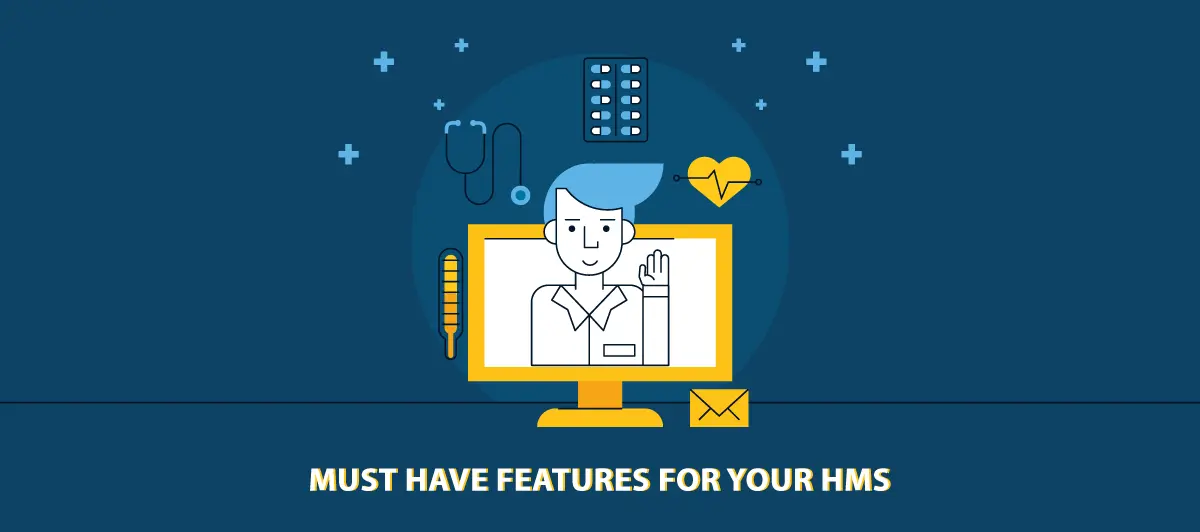Hospital Management Software Features
Quick Summary: Hospital management software is an essential tool for healthcare facilities. But what are its main features? patient record management, appointment scheduling, billing and invoicing, and staff scheduling? These Won’t end here! It streamlines operations, enhances patient treatment, and ensures efficient resource allocation. Additionally, it offers data security and analytics capabilities, aiding decision-making. Today, we will explain all the main and common hospital management software features.
Introduction
As we all know technology is revolutionizing every sector, and the healthcare sector is no exception. As we are moving forward towards an innovative world so fast. technology is drastically changing everything. Healthcare sector faces the challenging task of managing vast amounts of patient data, hospital operations, and Medical reporting efficiently. This is where Hospital Management Software (HMS) steps in! There are many interesting hospital management software features.
If you are planning to develop hospital management software, you must know hospital management system modules and software features. And for this you don’t need to worry about it! We will explain every feature of HMS in this blog only.
So, keep reading and understand what software do hospitals use!
What Is Hospital Management Software?
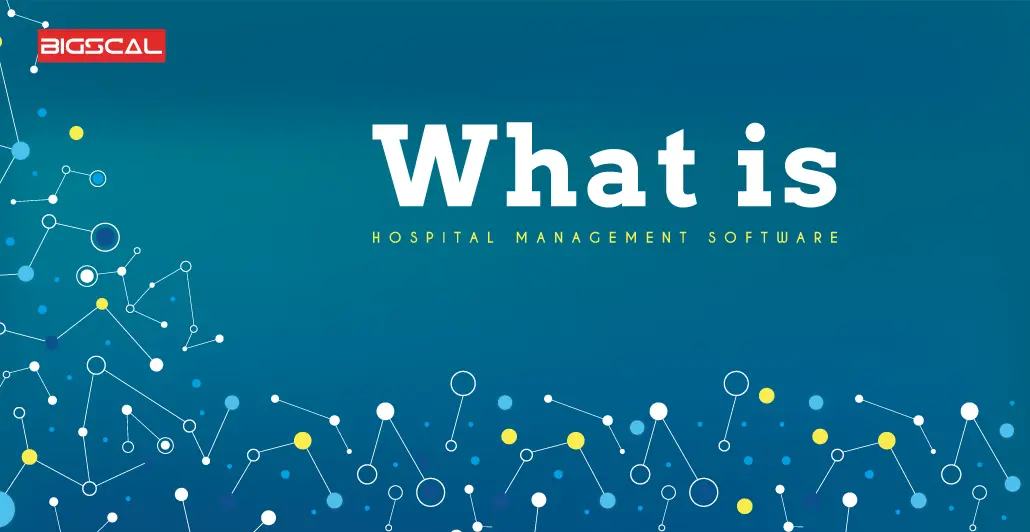
Here we explain hospital management software;
Before understanding the features, let’s first understand What is hospital management software? So, HMS you may also call it HIS (Hospital Information System). It is a transformative solution that changes the way hospitals operate. It’s not just the hospital management software development, it is a milestone of modern healthcare administration. But purpose of hospital management system?
Additionally, the hospital management software solution streamlines the entire healthcare system. It streamlines operations and simplifies patient registration, appointment schedule, and billing automation process.
Furthermore, this software enhances hospital management processes and the efficiency of healthcare professionals. With HMS, docs nurses can access patient data instantly. Which enables them for faster and more accurate diagnosis and treatments. Moreover, the medications become seamless, reducing the risk of errors. This translates to better patient outcomes and satisfaction.
HMS also helps in smooth management of inventory and financial data.
The Healthcare management system is really a very operational and tactical system and an amazing tool to manage hospitals and its tasks. So, Why wait when you can get numerous other benefits of hospital management by creating HMS, develop HMS now.
Some Popular HMS
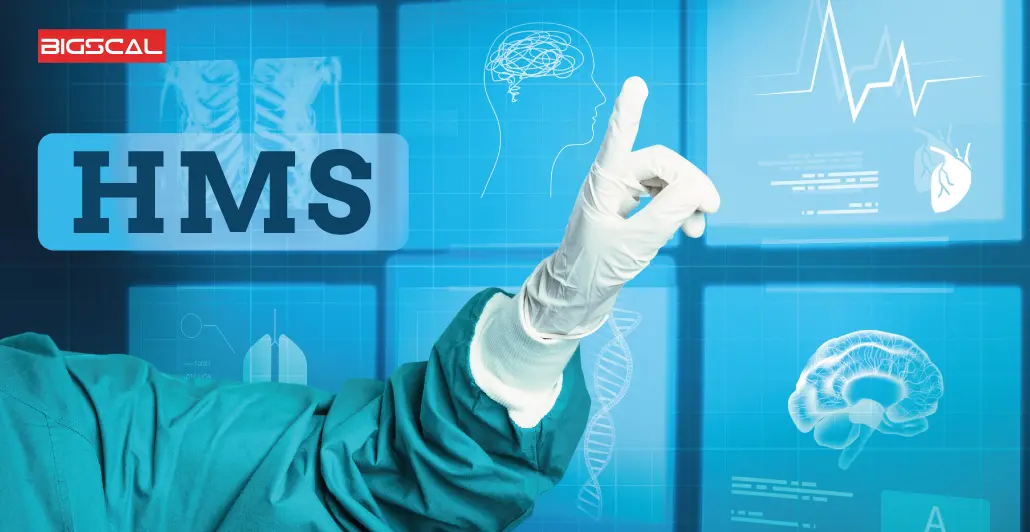
Let’s have a quick look at the top hospital software system which include various types of HMS like hospital management system development. So, check them now:
Epic System
Epic is popular in large healthcare organizations. It offers a comprehensive suite of tools for EHR and EMR system revenue cycle management, and patient engagement.
Cerner
Cerner provides EHR solutions and a range of healthcare management tools. It’s known for system interoperability and population health management capabilities and handling Clinical documentation.
McKesson
This software is for hospitals and health systems. It includes EHR, revenue cycle, hospital management software, and pharmacy management modules.
Athenahealth
Athenahealth focuses on practice management and medical billing software services. It’s commonly in medium medical practices.
AllScripts
Allscripts offers EHR, practice management, revenue cycle management, and patient engagement solutions for healthcare providers.
NextGen Healthcare
NextGen Healthcare provides EHR, manage practice of hospital workflow, and revenue cycle management solutions for healthcare organizations of all sizes.
Meditech
Meditech offers EHR and healthcare management software solutions for hospitals and health care facilities, with an emphasis on usability and interoperability.
Greenway Health
Greenway Health provides EHR, revenue cycle management solutions to healthcare partners, primarily serving ambulatory care providers.
eClinicalWorks
eClinicalWorks offers EHR and practice management software for small to mid-sized medical practices, along with outpatient management, with patient engagement tools.
Atria
Atria is a cloud-based EHR and practice management system designed for specialty medical practices, including dermatology and ophthalmology.
What Are Hospital Management Software Features For Hospitals And Doctors?
Here are the hospital inpatient management and software features that Hospitals and Doctor:
1. For Hospitals:
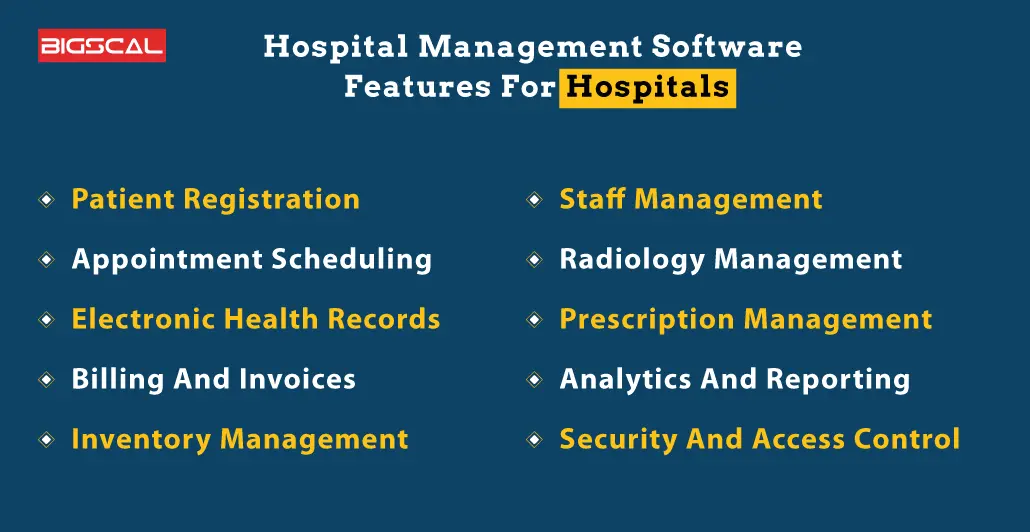
Patient Registration
Registration of patients in life is like the computerized counter in hospital system. It provide facility to front-line hospital staffs to note down and maintain the most vital patient information like name, contact details and medical records. The internalized check-in feature with Patient portal minimizes paperwork, simplifies the procedures and assures accuracy of patient files, thus if a doctor or a nurse needs to update and access patient data, that’s becomes smooth.
Appointment Scheduling
Patient Scheduling behaves as an online schedule for health facilities. It simplifies reservation of patient time slot and makes it possible for the hospital staff and doctors to set up appointments effectively. Patient can have an opportunity because they are able to take through time, which is convenient and will make a doctor’s programs more manageable. The immediate benefit is that it decreases the time spent waiting, it becomes more effective in terms of allocation of resources as well as it improves patient satisfaction due to having a well organized system of how one will do Appointment booking.
Electronic Health Records
EHR function just like people’s personal digital files. They create the database where the patient’s medical data and information such as his/her diagnoses, therapies and test results is stored in a secure digital format. Lastly, Electronic Health Record (EHR) systems support healthcare professionals’ timely access to vital patient information when it is authorized, resulting in more prompt and accurate diagnostic and treatment decisions. In addition, they ensure liaison among healthcare providers and thus eliminate the possibilities of incorrect records which are dental to paperwork.
Billing And Invoices
Healthcare Services Check Ins and Outs are managed by Hospital Management Software where Finance is represented to the Management. This fixture enables patients to receive precise bills with consistence of treatment and prescriptions procedures, consultations, and medications information. It does also undertake the task of claims management and payment tracking, which results in the simplification of the bureaucratic process among hospital administration. Hospitals can be maintained transparent with billing, lower billing mistakes, and ensure payment on time that is vital whether the health care operating facility should be in business or not.
Inventory Management
Online Inventory in the hospital management system is a robo-like smart room. It aids in hospitals carrying out the medical inventory and ensuring the patient communication regarding the medical equipment, supplies, medications, and instrumentation is flawless.
This functionality keeps on track outstanding inventory levels by temporarily limit them and it also brings forth your supply orders to make sure there is no shortage or too much inventory. The most important duty of proper stock take care is to ensure that hospitals have got the major resources and they did not waste. It also contributes to the cost effective healthcare delivery.
Staff Management
With healthcare management software, complicated work of managing clinicians is made simple. Facilitates the management of personnel records such as physicians, nurses, and office workers, with information such as their shifts, activities, and contacts. This assures the greatest number of competent practitioners is allocated and it makes possible to monitor attendants and performance.
Laboratory And Radiology Management
This software allows the easy scheduling and monitoring of processes related to the laboratory functions like running of the Lab management, tests management and the radiology image processing. As a result, blood samples can be managed and accessed by board, test results displayed and all medical documents and images can be controlled. It provides that it records and documents the tests appropriately and facilitates physicians and patients in access the tests results as well. Students learn principles of business law, leading to increased understanding of ethical conduct and company liabilities
Prescription Management
Prescription management and Workflow automation component of hospital software decreases the burden on clinicians when the doctors prescribe medications to the patients by making it a breeze. Composing and keeping electronic prescriptions on digital prescription pads is an advantage to physicians of this device which helps to cure medication errors, especially when regarding drug dispensing mistakes. In addition, it enables to follow up on patient’s medical history and means a patient receives the right treatment at a personalized level.
Analytics And Reporting
Clinical software solves the problem of management of information and produces the statistics that help to control clinic performance and trends. This is a fundamental report that contains phenotypic data, the association data, and business statistics. This helps rely on data-driven choices to plan healthcare facilities and healthcare budget allocation.
Security And Access Control
Clinical software solves the problem of management of information and produces the statistics that help to control clinic performance and trends. This is a fundamental report that contains phenotypic data, the association data, and business statistics. This helps rely on data-driven choices to plan healthcare facilities and healthcare budget allocation.
2. For Doctors
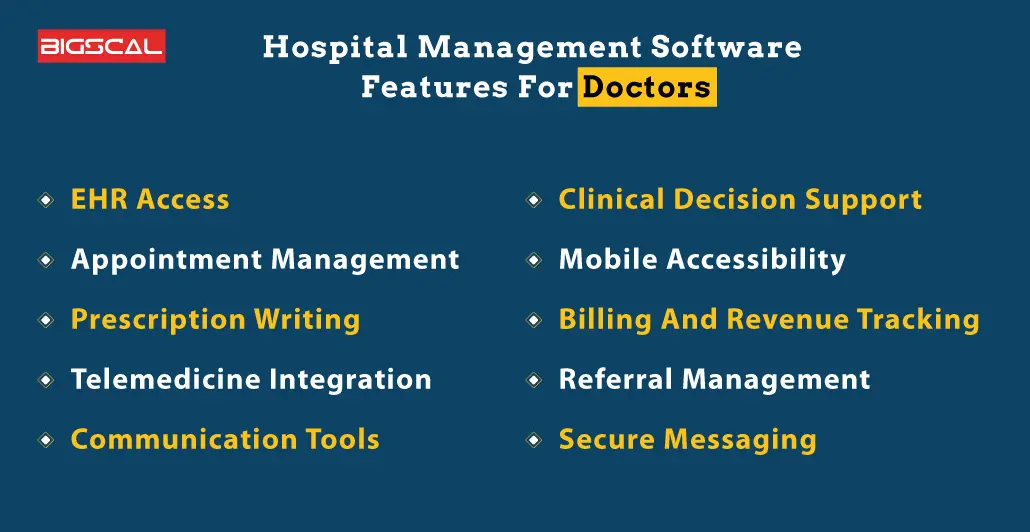
EHR Access
EHR Access teaches physicians to securely access and edit their patients’ medical files in a digital way. It provides with the ability to manage digitized files instead of traditional paper to be organized in an easily searchable way.
Physicians can see doctor’s prior records, test results, medications and others that will help them to administer the right and prompt care. Such capabilities are helpful with the performance improvement, increased accuracy and more productive results in patients’ cases.
Appointment Management
The Schedule Management module in the hospital management system enables the management of the appointments while keeping them standardized. Healthcare providers post their availability, patients can schedule appointments with a click of a button, and the system even reminds them of the appointments. Hence, this component leads to a reduced no-show rate, promotes the doctor’s working schedule and increases, generally, patients’ satisfaction.
Prescription Writing
Digital prescription writing allows the doctors to send digital prescriptions for and/or through the pharmacies. Legibility and accuracy, after all, are the key prerequisites, and it is a means to achieve them at an instant. Additionally, doctors can run medication checks for drug interactions, which can assure well-being of patients.
Telemedicine Integration
With telemedicine integration, we allow patients to benefit from online consultations. Doctors can video chat or have a talk with patients, plus they can avail themselves of healthcare remotely. It can be used to maximize effectiveness of rehabilitation sessions, to undertake follow-ups, minor treatments or when physical access is inconvenient.
Communication Tools
Advanced communication tools like that in the hospital management system are appropriate in making doctors to communicate confidently with patients and other colleagues. It also incorporates facial recognition and data security services that facilitate the seamless sharing of messages and files ultimately leading to better collaboration and patient engagement.
Clinical Decision Support
Clinical Decision Support can offer doctors useful information with evidence of clinical practice. There it assists in the detection and treatment of patients, which is enabled by the systematic access to current medical guidelines, clinical data, and research, as a result of which doctors are able to take an informed stance in matters concerning of their patients
Mobile Accessibility
Hospital administration software being equipped for mobile usage provides the doctors with patient’s records, schedules, and very relevant medical information get accessed via their mobile gadgets. The reason of this feature is that they can communicate and enlighten among and we can even before their presence in a hospital. They can view patient information, update records, and thereby handle appointments with ease from their own mobile devices be it a smartphone or a tablet, ensuring the smooth processing of patient care.
Billing And Revenue Tracking
Billing and revenue or invedntory tracking features help doctors manage their finances effectively. Doctors can generate bills, track payments, and monitor their earnings within the software. This ensures accurate billing for services, reduces billing errors, and provides financial transparency. It helps doctors maintain a clear overview of their practice’s financial health.
Referral Management
Referral management in hospital management systems is a feature that simplifies the process of referring patients to specialists or other healthcare providers. Doctors can easily send and receive referrals through the software, ensuring seamless continuity of care. It enhances communication among healthcare professionals, leading to better patient outcomes
Secure Messaging
Secure messaging features enable doctors to communicate securely with colleagues, nurses, and other healthcare staff. This ensures that sensitive patient info is protected while allowing for efficient collaboration. Doctors can share updates, discuss cases, and exchange critical information within a secure environment, enhancing the quality of patient treatment.
What Are Hospital Management Software Features For Patients?
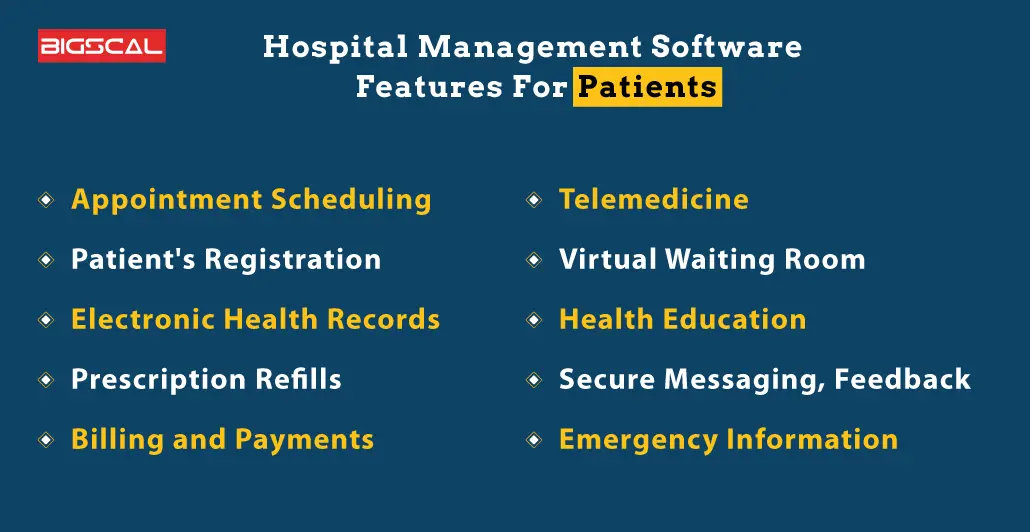
Appointment Scheduling
HMS enables patients to have booked appointments via several channels. In such case another, patients can decide the most convenient date for their appointment instead of waiting long time. This service feature involves up-to-date information to enable you plan quickly in order to take your appointment online and get the earliest available spot. As well, it does scheduled appointment reminders giving patient a time-window to attend, hence improving overall patients’ satisfaction and healthcare access.
Patient’s Registration
It simplifies the process of checking in at hospitals and clinics by doing away with the task of filling the details in a paper form. The patient can give groundwork records by the way of digital platforms, which will save a lot of time and paper work. This information is kept secure for future visits and no need to retype the forms again becomes necessary. It improves the quality of record-keeping and enables the services providers proper access to the patient’s medical history, recorded allergies, and Insurance processing, information as needed, hence streamlining the provision process.
Electronic Health Records
Electronic Health Record (EHR)are digital versions of a patient’s medical story. They consist of demos of diseases, types of treatments, names of meds as well as outcomes of tests. EHRs provide physicians an easy way to store and exchange health data, hence, the care become more unified and organized. Patients in addition can be in a position view their own EHRs this donation empower them to remain better engaged in the decisions making process related to their healthcare.
Prescription Refills
For this benefit, people won’t go through the cumbersome process of getting their prescription medications now. In turn, patients can access refills through the software. The software confirms these orders with care providers and physicians respectively. It will reduce the demand or medication via phone calls or personal trips to the health centers, saving people’s time and hence they will be able to receive their drugs on time, this promotes better medication adherence.
Billing and Payments
This is feature in hospital management software that secure the ease of billing payment system and for the Patients. They will be able to see all their bills charged, claims filed and payment alternatives online. Such a kind of transparency enables patients their healthcare costs feel comprehensible to them. The software enables the savings of time through the secure and fast movements of such funds making the financial aspect of healthcare more smooth.
Telemedicine
Telemedicine is like a virtual doctor’s visit. Patients can talk to their doctors through video calls or chat without going to the hospital. It’s convenient, especially for minor issues of follow-up consultations. You can discuss your health concerns from your home.
Virtual Waiting Room
Now we all can relate to the frustration we get while waiting for our turn. These features will erase that frustration. Hence, here you will wait for your turn, but online. Additionally, You can check in, wait, and get notification when it’s your time to see the doctor. It saves your time.
Health Reminders and Health Education
This feature sends you reminders for important health check-ups or medication doses. It also provides privacy for questions or concerns. Additionally, it provides you with medical data for basic knowledge related to your health.
Secure Messaging, Feedback, and Surveys
This hospital management software feature allows you to message your doctor securely for questions or concerns. You can also give feedback or fill out surveys to improve the hospital activities and overall experience.
Emergency Information
This stores important info like allergies, emergency contacts, and medical history. It’s Critical in emergencies when you are not able to speak for yourself, helping doctors make the right and quick decisions.
Mobile Access and Health Monitoring
The hospital management software feature should include mobile access. It allows patients to access their information using smartphones or tablets. Moreover, it should include health monitoring capabilities, enabling patients to track vital signs, medications, and health trends using wearable devices like fitness trackers. This promotes proactive self-care and ensures that patients stay informed about their health status.
Insurance Verification
Insurance verification is an important feature of hospital management systems for patients. It simplifies the often complex process of confirming insurance coverage and eligibility. Patients can input their insurance details, and the software verifies the information, helping patients understand their coverage and any potential out-of-pocket expenses. This feature reduces billing confusion, minimizes financial surprises, and ensures patients can make informed decisions about their healthcare options.
Language and Accessibility Support
Hospital management software features should be inclusive and accessible to all patients, regardless of their language or physical abilities. Language support ensures that the software can be used in multiple languages, making it accessible to vast patient populations. Accessibility support includes features like screen readers, large fonts, and easy navigation for individuals with disabilities. These features ensure that all patients can effectively use the software, improving the overall patient experience and promoting equal access to healthcare services.
How Bigscal Can Help You In Integrating These Hospital Management Software Features?
So, do you want to integrate these Hospital management system software features but am looking for a Hospital management software development company? Then, look no further because we are all here to help you. We can help you to integrate HSM features by providing technical expertise and support.
With our expertise in software development and healthcare technology, we can assist in a hospital management system project integrating features like EHR, appointment scheduling, billing and invoicing, inventory management, and patient management. We can ensure that these features provide a holistic view of patient data and streamline other administration related tasks and hospital processes.
Additionally, we can implement data security measures to protect sensitive patient information and ensure compliance with healthcare regulations. Our team can tailor the integration to meet the specific needs of the administrative system of the hospital, enhancing efficiency, accuracy, and patient care while reducing operational costs. Overall, Bigscal’s expertise in the hospital management systems software integration can significantly improve the functionality and effectiveness of healthcare institutions.
Conclusion
So, These were all the Hospital management software features you should know. Now, when you start your project of developing HMS, include these features as these assure a success of your project management. And Don’t forget to approach us and get all the benefits of hospital managemen
FAQ
What are the top hospital management companies?
Some of the top hospital management companies include HCA healthcare, Tenet Healthcare, Universal Health services (UHS), and community health systems. These companies manage and operate numerous hospitals and health care facilities across the US. They provide a great many medical facilities and services to their patients.
which software is used in hospitals?
Well, hospitals use various types of software to keep hospital data and manage their operations. These include, EHR systems like Epic, Cerner, and Allscripts are common patient records. Hospital management system (HMS) such as Meditech and McKesson handle administrative tasks. Additionally, PACS manage medical image data.
What is hospital management called?
Hospital management AKA healthcare administration or healthcare management, encompasses the planning, coordination, quality control, and oversight of all aspects of a hospital’s operations. These tasks involve administrative tasks, financial management, human resources, patient care, and facility maintenance to ensure efficient and effective healthcare delivery within a hospital.
Which model is best for hospital management system?
The best model for a hospital management system depends on various factors, including the hospital size, requirements, and budget. Some popular options include open-source systems like OpenMRS for flexibility and customization, or commercial solutions like Epic or Cerner for comprehensive features. The choice should align with specific hospital needs and resources.
What are 3 types of clinical information systems?
- EHRs
- CPOE systems
- digital sources of medical evidence
